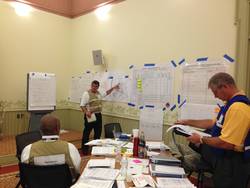Incident Management Teams Must Function as HROs

November 21, 2016
INCIDENT MANAGEMENT TEAMS (IMTs)
MUST FUNCTION AS
HIGH RELIABILITY ORGANIZATIONS (HROs)
When Failure is NOT an Option
In their book, Managing The Unexpected: Resilient Performance in an Age of Uncertainty (2nd Edition), Professors Karl E. Weick and Kathleen M. Sutcliffe, from the University of Michigan, discuss their study of management organizations for tasks where failure is not an option. Among several successful groups (Aircraft Carrier Flight Deck Crews, Nuclear Power Plant Operators, etc.), they identified Incident Management Teams (IMTs) as High Reliability Organizations (HROs). IMTs must constantly be ‘on their game’ to safely and effectively mitigate the chaos that comes with the problems that they are assigned to ‘fix’. Such natural disasters, man-made problems, or high-value events are complex and dynamic, can have significant consequences, and are (typically) high profile. IMTs lacking laser-sharp focus and unwavering attention to detail can get people seriously injured or killed; and can see the following results: significant damage to property or the environment; long-lasting impacts to businesses, organizations and/or communities; negative impacts to economies; and extremely negative public reaction/political fallout.
Weick and Sutcliffe identified five principles that were common in all HROs that they studied:
HRO Principle #1: Pre-occupation with Failure. The IMT understands that failure can (and does) happen and plans ahead for the ‘what ifs’. They respond quickly to problems that occur—fixing them while they are, hopefully, still small and have limited impact. Continuous Team improvement is an HRO hallmark.
HRO Principle #2: Reluctance to Simplify. Humans do a poor job of processing lots of details, especially when details come at them rapidly. To try to understand lots of detail, the human brain looks for patterns. Unexpected detail—outside of an anticipated pattern—may be disregarded as ‘an outlier’. HROs don’t allow these ‘outliers’ to just slip by. Efforts are made to understand why they occurred. Outliers might be thought of as “Near Misses” that could negatively impact or de-rail your IMT’s efforts to safely and effectively bring organization to chaos.
HRO Principle #3: Sensitivity to Operations. “We are from the Government; we are here to help”. In fact, we are expected to help—especially in solving large-scale problems. Yet, Government can easily get caught-up in the many aspects (and delays and excuses) of the bureaucratic processes that we administer daily. Bogging down in the ‘administrative aspects’ of an incident takes attention away from complex, dangerous and fast-moving situations. Thus, the IMT must constantly focus its efforts on providing the leadership and support that is needed by the ‘Boots on the Ground’ to accomplish the assigned mission.
HRO Principle #4: Commitment to Resilience. Things don’t always go the way our IMTs want them to when the World has turned upside-down. Thus, IMTs need to remain flexible and adjust to disappointing outcomes and, even, failure. The Agency Administrator WANTS your IMT to ‘win’ in your battle to solve ‘the problem’. You don’t get to pack-up your stuff and go home when things don’t go your way. The IMT MUST focus on the mission and keep trying, their very best, to achieve the requested outcome.
HRO Principle #5: Deference to Expertise. The existence of rank structure and/or lines of authority among the members of the IMT, and within their agencies, is very common. Yet, IMTs must understand that EXPERTISE IN SOLVING A PROBLEM may come from somewhere NOT AT THE TOP (maybe not even from folks with years and years of service). Your IMT needs to be open to using the best knowledge, skills and abilities that you can find—whatever its source—that WILL solve the problem.
Managing The Unexpected: Resilient Performance in an Age of Uncertainty is required reading for potential members of National Type-1 IMTs. It is not familiar material in many smaller IMTs. Your IMT might benefit from learning more about HROs and employing HRO techniques; especially if failure is not an option during your next assignment(s).
This book is available from many on-line vendors. The authors also released a new book, Managing The Unexpected: Sustained Performance in a Complex World in September, 2015.